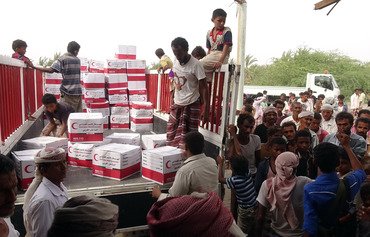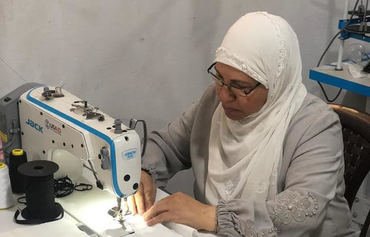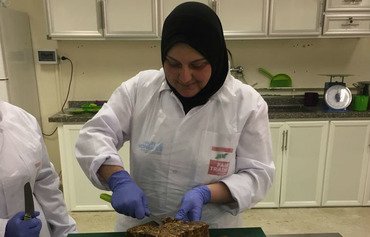Though its facility suffered extensive damage in Yemen's war, the Women Development Association in Shabwa province continues to play a leading role in helping low-income women support their families.
In addition to teaching women skills that help them earn money, the association conducts awareness-raising campaigns that help mothers steer their sons away from extremist groups, association president Fatima Faraj said.
On March 21st, Shabwa local council secretary-general Abd Rabbu Nasser inaugurated the new Women Development Association building, after the Emirates Red Crescent (ERC) completed its rehabilitation.
Speaking at the inauguration ceremony, ERC representative in Shabwa Mohammed al-Muhairi said the restoration of the building will enable the association to resume its work.
![The Emirati Red Cross rehabilitated the Women Development Association building in Shabwa, after it was looted and vandalised by the Houthi militia in 2015, and outfitted it with furniture. [Photo courtesy of the Women Development Association]](/cnmi_am/images/2018/04/17/12268-yemen-rehab-center-600_384.jpg)
The Emirati Red Cross rehabilitated the Women Development Association building in Shabwa, after it was looted and vandalised by the Houthi militia in 2015, and outfitted it with furniture. [Photo courtesy of the Women Development Association]
This includes sponsoring small and medium enterprises (SMEs) run by women, he said, and offering training courses that help them obtain the necessary skills to open a business or enter the workforce.
Al-Mashareq met with Faraj to discuss the association’s work and projects.
Al-Mashareq: How did the ERC contribute to the association’s rehabilitation?
Fatima Faraj: The association’s building was looted, vandalised and destroyed in 2015 when the Houthis (Ansarallah) took it over, and it became a site of military operations. The training halls were looted, and even doors and windows were taken. We submitted a request to the ERC to rehabilitate the building at a cost of 171,000 Saudi riyals ($45,600) and they agreed. We are thankful to them for it.
The ERC undertook a comprehensive rehabilitation of the building and added a service facility and a large hall, increased the height of its outer walls and outfitted the building, including the meeting hall and training hall, with furniture.
Al-Mashareq: What are the association’s most important activities?
Faraj: The association was founded in 1997 and it carries out training activities that enable women to enter the labour market. These include training courses on sewing, embroidery, computer use and housekeeping, as well as awareness-raising activities in the community.
The association targets women in low-income and poor families for training on sewing, hairdressing and weaving of maawez (traditional wrap-around garments), and also conducts courses on computer use.
It empowers women by making them self-reliant and gives them the ability to generate income for their families. The association also engages in outreach activities on issues of interest to the community, including raising awareness about health issues such as cholera and dengue fever, among others.
Al-Mashareq: Does the association have workshops and training facilities?
Faraj: The association used to own a sewing factory and another for the weaving of maawez, hairdressing training equipment and a computer lab. But these factories and resources were looted in the fighting.
So the association submitted a request to the ERC, asking for help to re-establish these factories and enable it to resume its developmental role in equipping the women of Shabwa with the necessary skills to help them access the labour market, become productive members of the community and help themselves and their families meet their daily needs.
Al-Mashareq: What is the association's plan regarding training in the coming days in the absence of the required factories and workshops?
Faraj: The association has not stopped conducting training courses for women who wish to participate. It rented factories to hold these courses, paid for with token contributions from the participating women and benefactors.
As for upcoming courses, the association has opened registration for courses in all areas to women who wish to join, and it awaits a response from the ERC with regard to furnishing the association with the required factories.
In the event the response is late in coming, the association will rent these factories and hold these courses to help equip the beneficiaries with additional skills and expertise.
Al-Mashareq: What about the association's anti-extremism outreach activities?
Faraj: The association has played an important role in raising awareness in this regard. We conducted awareness campaigns by directly targeting women and mothers whose sons are members of al-Qaeda. These campaigns were designed to raise awareness about the dangers of the scourge of terrorism and its consequences for the individual and the community.
This was done in a way that motivated them to try and steer their sons away from these groups, and also warn other family members not to join terrorist groups that seek to vandalise, destroy and kill in the name of religion.
We began conducting these campaigns in 2016 and 2017, and in some areas at the beginning of 2018. We targeted a number of areas in which these groups had a clear presence, such as the districts of al-Saeed, Mayfaa and Ataq.
Association members in those areas educate women about the dangers of terrorism, and conduct field visits, including visits to women whose sons or relatives joined these groups.

![On March 21st, the Shabwa local council inaugurated the new Women Development Association building, after the Emirates Red Crescent (ERC) completed its rehabilitation. [Photo courtesy of the Women Development Association]](/cnmi_am/images/2018/04/17/12267-women-dev-association-600_384.jpg)







It's necessary to build a school for people with disabilities with dorms for students.
Reply1 Comment(s)